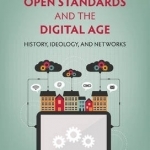Open Standards and the Digital Age: History, Ideology, and Networks
BookThis item doesn’t have any media yet
2014 | Business & Finance
How did openness become a foundational value for the networks of the twenty-first century? Open Standards and the Digital Age answers this question through an interdisciplinary history of information networks that pays close attention to the politics of standardization. For much of the twentieth century, information networks such as the monopoly Bell System and the American military's Arpanet were closed systems subject to centralized control. In the 1970s and 1980s however, engineers in the United States and Europe experimented with design strategies to create new digital networks. In the process, they embraced discourses of 'openness' to describe their ideological commitments to entrepreneurship, technological innovation, and participatory democracy. The rhetoric of openness has flourished - for example, in movements for open government, open source software, and open access publishing - but such rhetoric also obscures the ways the Internet and other 'open' systems still depend heavily on hierarchical forms of control.
Related Items:
| Published by | Cambridge University Press |
| Edition | Unknown |
| ISBN | 9781107612044 |
| Language | N/A |
Images And Data Courtesy Of: Cambridge University Press.
This content (including text, images, videos and other media) is published and used in accordance
with Fair Use.
